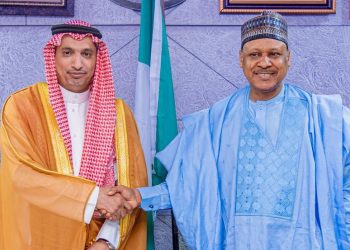United States Vice President, Kamala Harris has cited Nigeria with about two thirds of the population of the US, as one of the African countries harmed by climate crisis with more than 1.4 million people displaced last year alone due to what she called “historic flooding”.
Harris who was in Zambia on her weeklong trip to African continent on Saturday, said that the continent and the nations of Africa really are some of the lowest emitters in terms of greenhouse gas emissions but are paying some of the highest costs.
She also cited Somalia, which has a population of about the size of New York, said “43,000 people died due to drought last year alone and Malawi, which is also about the size of New York in terms of the population, to- — Tropical Cyclone Freddie caused over 500 deaths”.

Saying, “these are just some examples of the proportion of harm that is being experienced on this continent and as an example of what is happening around the world that must be addressed with creative solutions”.
Harris made it known that she announced on Friday, that United States will generate more than $7 billion in private sector commitments, to support climate resilience, adaptation, and mitigation.
“This includes commitments to support climate-smart agriculture; to increase access to financing and insurance, which is a very big deal to more, on this continent, than 116 million farmers, which is about half of the farmers on the continent.

“And let’s think of the benefits of this type of approach. For example, when we think about access to insurance for small farmers, this will help farmers to recover financially after a difficult season or a catastrophic event.
“As for the role specifically of the United States government, the United States will continue to support and expand this work. Some examples of the work we are doing to that end, on the continent, includes helping to improve climate modeling, weather forecast, and to build new weather stations.
“Here in Zambia, we know almost 80 percent of the farmers are women. And by providing microfinance which is essentially access to capital to help women start a farm, grow farm, and increase not only productivity in terms of the food production piece of it, but also increase the economic status of their families in their communities”, she said.











